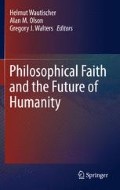Abstract
Philosophical faith traverses the divide between the transcendental understanding of phenomena and the unknowable dimensions of transcendent reality. Human beings are transformed through their free act of either accepting or rejecting the descent of Being into time as a lived faith and non-cognitive form of knowledge expressed in the cipher language of culture. The content of Jaspers’ philosophic faith is examined in three interpretations: Faith with belief, faith without belief, and faith beyond belief. The essay opts for philosophical faith as beyond belief. The basic argument is that such faith is neither knowable nor demonstrable. Revealed truth and dogmatic metaphysics excludes the relativity of existential historicity. In this manner, philosophic faith is grasped as “not a knowledge I have, but a certainty that guides me.”
Access this chapter
Tax calculation will be finalised at checkout
Purchases are for personal use only
Notes
- 1.
The Norton Anthology of Poetry (revised), eds. A. Allison, H. Barrows, C. Blake, A. Carr, A. Eastman, and H. English; (New York, NY: W.W. Norton & Company, 1975), pp. 850–851. Arnold, a chief inspector of public schools in England and Wales, also wrote Culture and Anarchy (1869). This influential work exhorted ancient Greek and Latin culture as the highest standard of human achievement. The “sweetness and light” of dead cultures was a way of making the best that had been thought and known available through general education, and it was the Victorian bastion against materialism and anarchy.
- 2.
Immanuel Kant, Critique of Pure Reason, trans. Norman Kemp Smith (New York, NY: St. Martin’s Press, 1965), p. 7. Further references in the text of this essay are to this edition.
- 3.
Leonard Ehrlich, Karl Jaspers: Philosophy as Faith (Amherst, MA: The University of Massachusetts Press, 1975), p. 137 [Henceforth cited as PF]. The quotation is from Karl Jaspers, The Origin and Goal of History (New Haven, CT: Yale University Press, 1979 (1949)), pp. 219–220. Ehrlich also cites propositions from a radio address by Jaspers in 1949–1950: Karl Jaspers, The Perennial Scope of Philosophy, trans. Ralph Mannheim (New York, NY: Philosophical Library, 1949), p. 30: “God is. There is an absolute imperative. The world is an ephemeral stage between God and existence.”
- 4.
“Flyer’s Fall” in Wallace Stevens, Collected Poetry and Prose, eds. Frank Kermode and Joan Richardson (New York, NY: The Library of America, 1996), p. 250. Poem cited by Richard Kearney, Anatheism, Returning to God After God (New York, NY: Columbia University Press, 2010), p. 3.
- 5.
Karl Jaspers, Basic Philosophical Writings, edited, translated and with introductions by Edith Ehrlich, Leonard H. Ehrlich, and George B. Pepper (Atlantic Highlands, NJ: Humanities Paperback Library, 1994 (1986)), editors’ introduction, p. 441.
- 6.
Karl Jaspers, Philosophy, 3 volumes, trans. E.B. Ashton (Chicago, IL: The University of Chicago Press, 1969 (1932)), vol. 2, p. 245. [Henceforth cited as P with volume number]
- 7.
Karl Jaspers, The Origin and Goal of History (Westport, CT: Greenwood Press, 1976 (1949)), p. 214.
- 8.
Paul Ricoeur, “The Relation of Jaspers’ Philosophy to Religion” in The Philosophy of Karl Jaspers, Augmented Edition, edited by Paul Arthur Schilpp (La Salle, IL: Open Court Publishing Company, 1981 (1957)), pp. 611–642.
Author information
Authors and Affiliations
Corresponding author
Editor information
Editors and Affiliations
Rights and permissions
Copyright information
© 2012 Springer Science+Business Media B.V.
About this chapter
Cite this chapter
Langley, R. (2012). Three Interpretations of the Content of Jaspers’ Philosophical Faith. In: Wautischer, H., Olson, A., Walters, G. (eds) Philosophical Faith and the Future of Humanity. Springer, Dordrecht. https://doi.org/10.1007/978-94-007-2223-1_12
Download citation
DOI: https://doi.org/10.1007/978-94-007-2223-1_12
Published:
Publisher Name: Springer, Dordrecht
Print ISBN: 978-94-007-2222-4
Online ISBN: 978-94-007-2223-1
eBook Packages: Humanities, Social Sciences and LawPhilosophy and Religion (R0)

